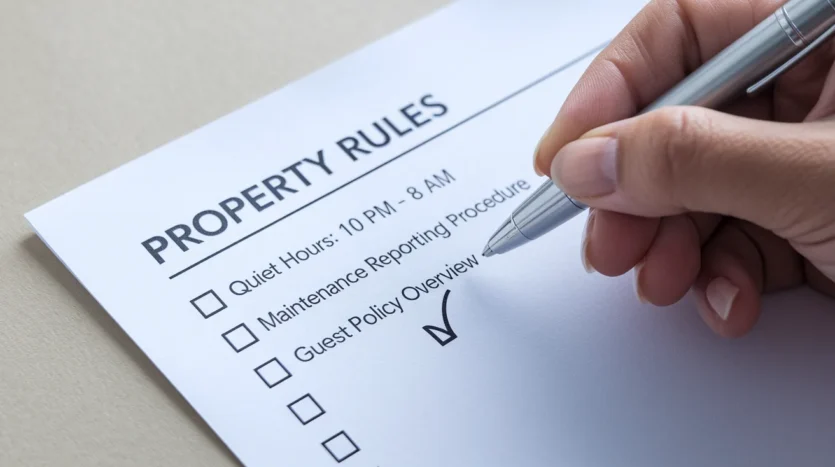5 Must-Have Features of a Tenant Handbook for Dubai Properties
A well-crafted Tenant Handbook is more than just a document; it’s the cornerstone of a smooth landlord-tenant relationship, especially in a dynamic market like Dubai. It clearly outlines expectations, responsibilities, and procedures, acting as a vital reference guide that minimizes misunderstandings and potential disputes. Essentially, it sets the stage for a positive and legally compliant tenancy, covering crucial areas from rent payments and maintenance requests to property rules and emergency protocols, ensuring both parties are protected and informed.
Why is a Comprehensive Tenant Handbook Crucial in Dubai?
Investing in Dubai’s property market offers significant opportunities, but successful landlording hinges on clear communication and established processes. A Tenant Handbook serves several key functions:
- Sets Clear Expectations: It leaves no room for ambiguity regarding rules, payments, and responsibilities.
- Provides Legal Protection: It documents agreed-upon terms and procedures, referencing the tenancy agreement (Ejari).
- Reduces Disputes: By proactively addressing common issues, it minimizes friction between landlords and tenants.
- Saves Time: It acts as a go-to resource for tenants, reducing repetitive queries to the landlord or property manager.
- Enhances Professionalism: It demonstrates a commitment to organised and fair property management.
For landlords aiming for hassle-free property ownership, a detailed handbook is indispensable.
The 5 Essential Features Your Tenant Handbook Must Include

To be effective, your Tenant Handbook should be comprehensive yet easy to understand. Here are five non-negotiable sections:
1. Clear Rent Payment Procedures
This section is fundamental. Misunderstandings about rent are a common source of conflict, so clarity is paramount.
- Payment Amount & Due Date: Explicitly state the exact rent amount and the specific day it’s due each month/quarter/year as per the Ejari contract.
- Accepted Payment Methods: Detail how rent can be paid (e.g., bank transfer, post-dated cheques, specific payment portals). Provide necessary details like bank account information if applicable.
- Late Payment Policy: Clearly outline the grace period (if any) and the consequences of late payments, including any potential fees, adhering to RERA regulations.
- Contact Person: Specify who the tenant should contact regarding payment queries.
“Clarity in financial matters is the bedrock of trust in any rental agreement.”
2. Maintenance and Repair Protocols
Property upkeep is a shared responsibility, and defining the process prevents delays and frustration.
- Reporting Non-Emergency Issues: Explain the preferred method for reporting routine maintenance requests (e.g., email, specific online portal, dedicated phone number). Specify expected response times.
- Emergency Repairs: Clearly define what constitutes an emergency (e.g., major water leak, electrical fault, security issue). Provide a dedicated 24/7 emergency contact number and outline immediate steps the tenant should take.
- Landlord vs. Tenant Responsibilities: Briefly outline typical responsibilities (often detailed further in the lease). For example:
- Landlord: Structural repairs, major systems (AC, plumbing, electrical).
- Tenant: Minor upkeep, replacing consumables (like light bulbs), reporting issues promptly.
- Access for Repairs: Explain the procedure for scheduling maintenance visits, respecting the tenant’s right to quiet enjoyment and notice periods as per Dubai law.
Understanding basic tenant rights regarding repairs is crucial. While specific laws vary, resources like the Dubai Land Department (DLD) or RERA offer guidance on local regulations.
3. Property Rules and Regulations
This section establishes guidelines for harmonious living, particularly in shared communities.
- Noise Levels: Specify quiet hours and general expectations regarding noise.
- Pets: Clearly state the policy on pets (if allowed, types, sizes, any associated conditions or fees).
- Guests: Outline rules regarding short-term and long-term guests, if any.
- Smoking: Define the smoking policy within the unit and common areas.
- Common Areas: If applicable (apartments, villas in communities), detail rules for using shared facilities like pools, gyms, parking areas.
- Alterations: Specify what modifications tenants can or cannot make to the property (e.g., painting, installing fixtures) and the process for requesting permission.
4. Move-in and Move-out Procedures
Clear procedures for the beginning and end of the tenancy prevent disputes, especially concerning the security deposit.
- Move-in Inspection: Detail the process for the initial property inspection and the importance of the signed condition report.
- Key Handover: Explain how and when keys will be provided and returned.
- Notice Period: Reiterate the notice period required before vacating, as stated in the lease agreement and governed by RERA.
- Move-out Inspection: Describe the final inspection process.
- Security Deposit: Explain the conditions under which the security deposit will be returned, potential deductions (e.g., damages beyond normal wear and tear, unpaid bills), and the timeline for its return, aligning with Dubai’s rental laws.
- Utility Transfers: Remind tenants of their responsibility to transfer DEWA and other utilities.
Reputable sources often provide checklists for moving inspections, which can be adapted. Search for “move-in move-out checklist for tenants” for general examples.
5. Emergency Contacts and Procedures
Safety is paramount. This section should provide tenants with crucial information for emergencies.
- Key Contact Numbers:
- Dubai Police: 999
- Ambulance: 998
- Fire Department (Civil Defence): 997
- DEWA (Electricity/Water): 991
- Landlord/Property Manager Emergency Contact: [Insert Your Emergency Number Here]
- Building Security (if applicable): [Insert Number]
- Basic Emergency Procedures: Briefly outline steps for common emergencies like fire (evacuation routes) or major water leaks (location of main shut-off valves, if accessible and safe to operate).
Streamlining Landlord Responsibilities with West Gate Dubai

Creating and consistently managing a comprehensive Tenant Handbook, alongside all other landlord duties, requires significant time and expertise. This is where professional property management shines.
At West Gate Dubai, we handle every aspect of property management, from tenant screening and rent collection to maintenance coordination and ensuring legal compliance, including the development and enforcement of robust Tenant Handbooks tailored to your specific property. We ensure your investment is protected and your tenants have a clear, professional point of contact.
Explore how our expert Property Management Services can provide you with peace of mind and optimize your rental income.
Maximize Your Investment Potential
Understanding the potential return on your Dubai property is key. A well-managed property with clear guidelines, like those outlined in a good Tenant Handbook, contributes to lower vacancy rates and better returns.
Curious about your potential earnings? Use our ROI Calculator to estimate the return on your Dubai property investment.
Conclusion
A comprehensive Tenant Handbook is an invaluable tool for any landlord in Dubai. By clearly outlining payment procedures, maintenance protocols, property rules, move-in/out processes, and emergency contacts, you foster a transparent, respectful, and dispute-free relationship with your tenants. While creating one takes effort, the long-term benefits of reduced conflict, saved time, and enhanced professionalism are undeniable. For investors seeking seamless management and optimized returns, partnering with a dedicated property management team like West Gate Dubai ensures these essential details are expertly handled.





